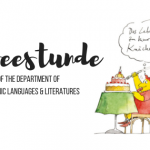Rolling Admission until April 1 Read More »
Author Archives: Department of German
iPRAKTIKUM Yiddish in the City: Festival Programming & Production Internships at TJFF 2026
Application deadline: 9 January 2026 Read More »
iPRAKTIKUM internship opportunities with the German Saturday Schools
Find out if teaching is your thing! Deadline 12 Dec 2025 Read More »
How to apply to the graduate program 2025-2026
The Department of Germanic Languages & Literatures offers Ph.D. students a generous funding package that is guaranteed for five years. Sixth-year students are eligible for a doctoral completion grant. We are also able to fund many students in our one-year MA program with a combination of teaching opportunities and internal fellowships. Applications to the Graduate Program in German Literature, Culture and Theory must be submitted through the School of Graduate Studies online application website. The complete application includes: the online form submission of transcripts (please submit electronic transcripts, originals are only required after admission) letters of recommendation (MA:2, PhD:3) a brief resume a sample of written work a statement of up to 700 words outlining your research interests and reasons for embarking on graduate study Please consult the School of Graduate Studies (SGS) Calendar and the departmental Graduate Handbook for details on eligibility criteria. Additional information may be obtained from the SGS Admissions page, the SGS Degree Progams Quick Facts (MA) and Degree Programs Quick Facts (PhD), and the SGS application FAQ. The deadline for online application and payment of the application fee is 15 January 2025. Rolling admission is in progress for the MA program to commence Fall 2025. ... Read More »
Global Languages Initiative Workshop with Marje Stock
Friday, October 18, 2024 | 2:00 – 4:00 p.m.Charbonnel Lounge, St. Michael’s College RSVP HERE We are exited to invite you to the upcoming Global Languages Initiative Workshop, hosted by the German Department, with guest speaker Marje Zschiesche-Stock. Join us on for an engaging discussion on The Use of AI in the Second Language Classroom. The use of AI in educational contexts is currently a hot topic. The integration of AI into teaching will inevitably become a reality. How can contemporary language education respond to this? How can AI be productively integrated into teaching with added value? Our initial attempts show that it can also be an enrichment and act in a way as a friend and helper. But does it hinder the development of critical and independent thinking in our learners? In this workshop, we want to explore these questions and think together about how AI can simulate authentic language interactions and improve the communicative skills of learners at all levels. About Marje Zschiesche-Stock Marje Zschiesche-Stock has many years of international experience as a lecturer and trainer at a variety of institutions and educational establishments, where she has taught German language and culture at all levels and for all ... Read More »
Kaffeestunde: Friday, October 18 at 2 pm
Friday, October 18 at 2 pm Read More »
Kaffeestunde: Thursday, January 23 at 1 pm
Thursday, January 23 at 1 pm Read More »
Kaffeestunde: Friday, February 28 at 2 pm
Friday, February 28 at 2 pm Read More »
2024 Newsletter Out Now!
Out now! Read More »
Kaffeestunde: Thursday, February 6 at 1 pm
Thursday, February 6 at 1 pm Read More »
 Department of Germanic Languages & Literatures University of Toronto
Department of Germanic Languages & Literatures University of Toronto






